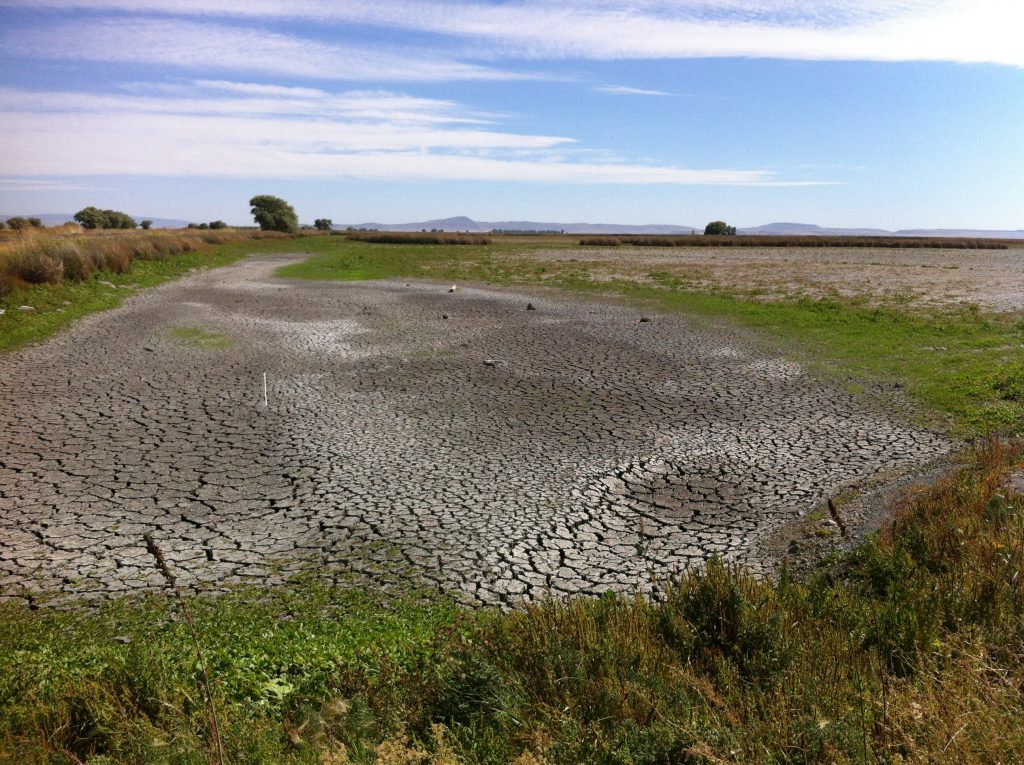Klamath Advocates Condemn Bureau of Reclamation’s Willful Destruction of the “Everglades of the West”
Conservationists Call on Gov. Kate Brown, Senators Wyden and Merkley to Stop Likely Catastrophic Waterfowl Die-Off, Hold Bureau Accountable for Longstanding Waste and Abuse
Contacts: Jim McCarthy, WaterWatch of Oregon, (541) 708-0731
Bob Sallinger, Audubon Society of Portland, (503) 380-9728
Steve Pedery, Oregon Wild, (503) 283-6342
March 26, 2018

Parched Lower Klamath NWR, Sept. 20, 2013
Today three conservation groups, Audubon Society of Portland, Oregon Wild and WaterWatch of Oregon condemned the U.S. Bureau of Reclamation’s proposal to drain wetlands on Lower Klamath National Wildlife Refuge during a crippling drought, even as millions of birds arrive for the peak of spring waterfowl migration. The action, intended to provide public water to private agribusiness interests in the Klamath Project, represents just the latest wrongdoing in the Bureau’s long record of willful destruction of the Klamath Basin National Wildlife Refuge Complex, widely known as the “Everglades of the West.”
“The Klamath Basin’s refuges are some of the most important bird habitat in the Western United States, and Lower Klamath is the jewel in its crown, famed for being the nation’s first federally-established waterfowl refuge,” said Portland Audubon Conservation Director, Bob Sallinger. “Unfortunately the plan put forward by the Bureau on Friday sets the stage for yet another catastrophic bird kill, something which has become a regular occurrence here as a direct result of the Bureau’s unlawful actions. We call on Oregon’s Governor and U.S. Senators to use their voices to end the destruction of these invaluable public lands.”
In recent years, Bureau water management decisions and drought have resulted in Lower Klamath wetlands going dry during the critical spring and fall migratory periods. Since 2012, tens of thousands of birds on these refuges have died for lack of water resulting from decisions made by the Bureau. When few wetland acres are available on these refuges due to lack of water, large numbers of waterfowl pack together during migration periods, leading to lethal disease outbreaks. Refuge staff estimated that some 20,000 birds perished this way in 2014. Similar conditions on these refuges sparked massive waterfowl die-offs in 2012 and 2013.
More recently, federal investigators responding to whistleblower complaints revealed that between 2008 and 2015, the Bureau misspent $32 million in federal funds intended to protect fish and wildlife in the Klamath during drought. The Bureau instead handed the taxpayer money over to private agribusiness interests in the Klamath Project, who used it as a slush fund, paying to subsidize their own water use, as well as salaries, rent, travel, and other expenses.
For example, according to the investigators’ official report, the agribusiness slush fund paid to provide 125,620 acre-feet of water for private irrigation use on the Klamath Project during the 2014 drought. Lower Klamath National Wildlife Refuge received only 19,730 acre-feet of water that year, when some 20,000 birds died in a disease outbreak sparked by lack of water. To this day, no one has been held accountable for the scandal and the Bureau continues to block the refuges from fully accessing their determined water rights.
“We are simply asking that our elected leaders publicly demand that the Bureau obey the law,” said Jim McCarthy, Southern Oregon Program Manager for WaterWatch of Oregon. “The water and taxpayer funding for these refuges belongs to the public, not private agribusiness interests. We simply want our Senators to do their job and reign in this renegade agency before it causes even more harm to Oregon’s natural heritage, economy, and taxpayers.”
The Klamath Basin refuges’ wetlands represent some of the most important waterfowl habitat in the United States. An estimated 80% of Pacific Flyway waterfowl utilize the wetlands during their migratory journeys and more than 260 species of birds have been observed on the refuges.
“By diverting what little water the wildlife areas have to benefit agribusiness, the Trump administration is setting the stage for large bird kills later this year,” said Steve Pedery, Conservation Director of Oregon Wild. “Governor Kate Brown, and Senators Wyden and Merkley, need to stand up and say ‘no’ to this attack on America’s wildlife.”
The Klamath Wetland Complex once encompassed more than 350,000 acres but today it has been reduced to 80,000 acres to make way for private commercial agriculture. In addition more than 22,000 publicly-owned refuge acres are leased for private commercial agriculture, displacing essential wildlife habitat.
“The federally-designated purposes of the Klamath Basin Refuges include providing diverse habitats for migrating birds and wildlife, but these purposes cannot be fulfilled if the Bureau is allowed to siphon off the refuges’ water and taxpayer funding with impunity,” added Audubon’s Sallinger. “Frequent drought and climatic changes have already had significant impacts on these refuge wetlands, but thus far the impacts of the Bureau’s waste and abuse have been far worse. It’s time for this to stop.”

